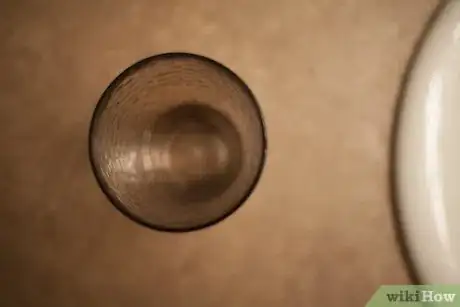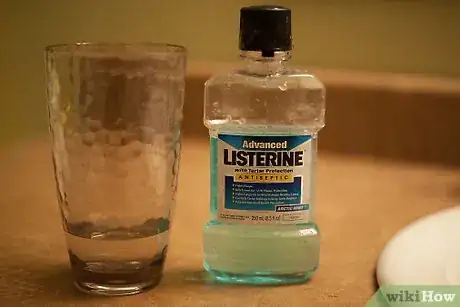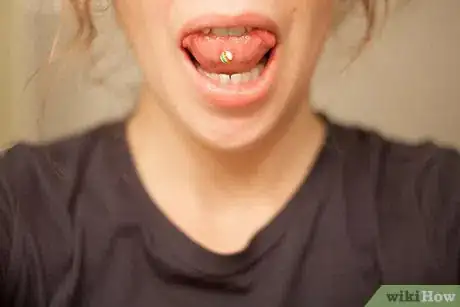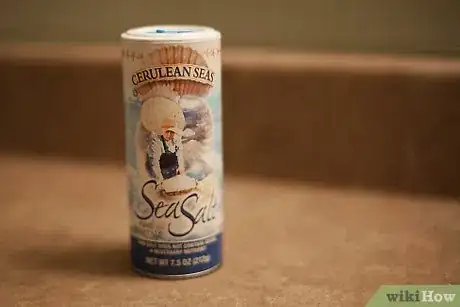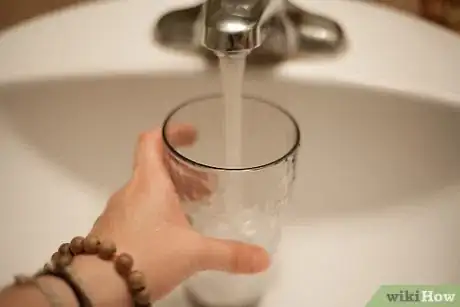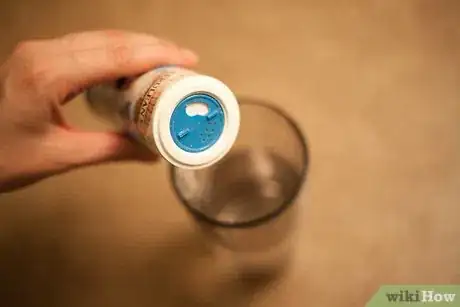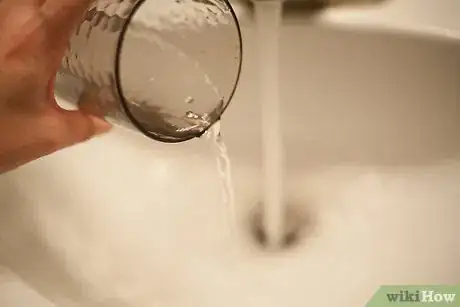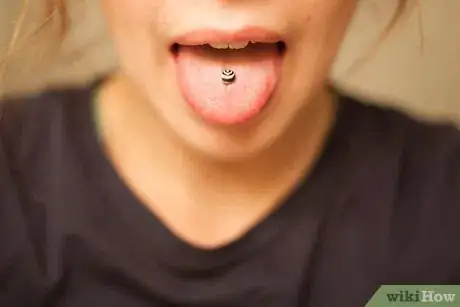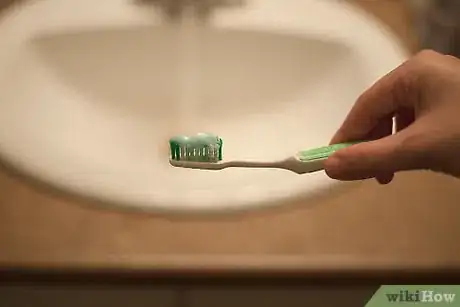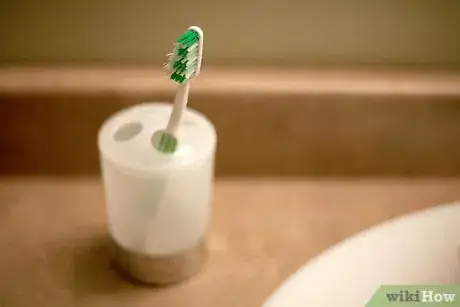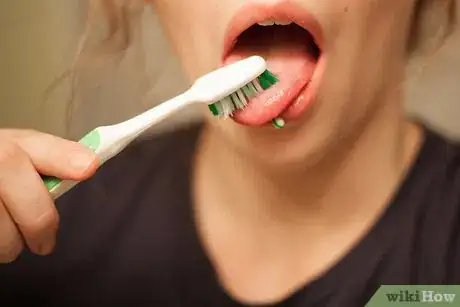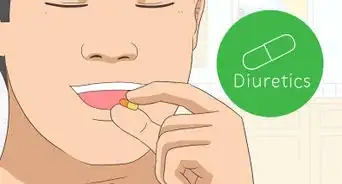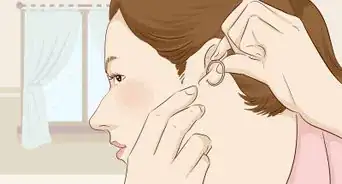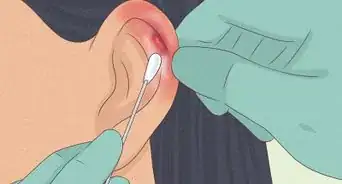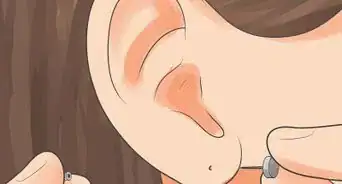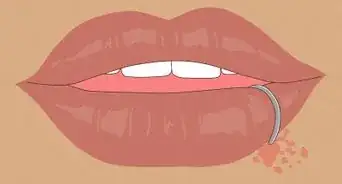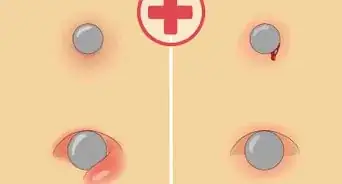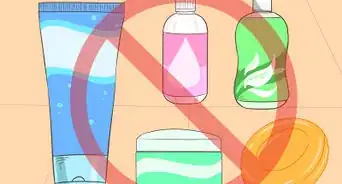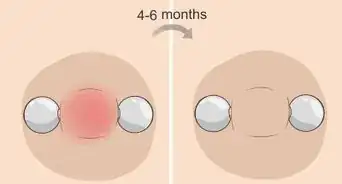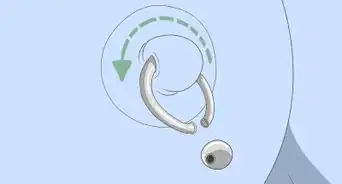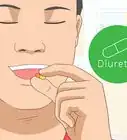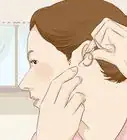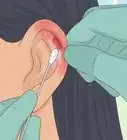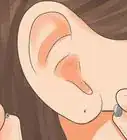wikiHow is a “wiki,” similar to Wikipedia, which means that many of our articles are co-written by multiple authors. To create this article, 25 people, some anonymous, worked to edit and improve it over time.
wikiHow marks an article as reader-approved once it receives enough positive feedback. In this case, 92% of readers who voted found the article helpful, earning it our reader-approved status.
This article has been viewed 322,777 times.
Learn more...
So, you just got a new piercing. Are you sure you know how to take care of it? Usually, you will not have to put in much effort into maintaining your accessory, but a few simple steps will ensure cleanliness and speedy wound healing.
Steps
Oral Rinse
-
1The optimal way to care for your piercing is to rinse your mouth for 30-60 seconds with a medical-grade oral rinse (such as Tech 2000 or Biotene) after every meal during the initial healing period (3-6 weeks).
-
2If a medical grade oral rinse is not available, the next best thing is to dilute 4 ounces of an oral antiseptic with 4 ounces of water. This will de-intensify the antiseptic and prevent it from irritating your piercing.
- (Note: Do not use plain mouth-wash because it will do nothing for your piercing—only mask your halitosis.)
Advertisement -
3Be careful not to over-clean your piercing, as this will prevent proper healing. (Signs of over-cleaning include a very white or yellow looking tongue.)
Sea Salt Rinse
-
1In addition to the oral rinse after every meal, sea salt soaks will also help heal your piercing.
-
2First, fill a fresh disposable cup with approximately 8 ounces of water and add ¼ teaspoon of sea salt, stirring until it is dissolved.[1]
-
3
Brushing Your Teeth
-
1- For the first week of your new piercing you are advised to only brush the front teeth and then on the second week you may proceed to brush back and gently the tongue.
-
2It is important to brush your teeth three times daily while your piercing is healing. Brushing your teeth will cut down on the amount of bacteria and food particles in your mouth.
-
3It is suggested that you purchase a new soft-bristle toothbrush to use during the initial healing period. Also, plaque (a white crusty shell) will begin to build up on your tongue jewelry if you do not gently brush the balls and post.[2]
-
4You should brush your jewelry daily if you want to prevent plaque build-up.
Miscellaneous
- Ice and other cold liquids can help reduce swelling. Ice pops, ice cream, and frozen yogurt are also good ways to reduce swelling, but be sure to perform either a sea-salt or oral rinse following your snack (this is not necessary if you just use plain ice). Swelling tends to last 3-5 days.[3]
- Ibuprofen: For those who are extremely sensitive, an over-the-counter anti-inflammatory such as ibuprofen (Motrin IB, Advil, etc.) can help reduce swelling and pain.
Community Q&A
-
QuestionI was told to brush my new piercing but it hurts when I try. Is this normal? I also seem to be salivating more than normal.
 Community Answerit is perfectly normal for the pain when brushing. Gently brush your tongue. Salivating more is normal.
Community Answerit is perfectly normal for the pain when brushing. Gently brush your tongue. Salivating more is normal. -
QuestionHow does a tongue look after piercing it?
 Community AnswerIt's going to be extremely swollen for the first three to five days. Normally, the swelling can last 10 to 14 days after the piercing. You will begin to see an imprint where the top ball rests on your tongue, and perhaps some white stuff coming out of your tongues but this is all totally normal. A tongue piercing is one of the fastest healing piercings you can receive, however it is one of the most painful and easiest to get infected. You will also talk very funny for a few days, perhaps weeks but that will go away.
Community AnswerIt's going to be extremely swollen for the first three to five days. Normally, the swelling can last 10 to 14 days after the piercing. You will begin to see an imprint where the top ball rests on your tongue, and perhaps some white stuff coming out of your tongues but this is all totally normal. A tongue piercing is one of the fastest healing piercings you can receive, however it is one of the most painful and easiest to get infected. You will also talk very funny for a few days, perhaps weeks but that will go away. -
QuestionI'm getting my tongue pierced - how much is it going to hurt?
 Community AnswerThe initial piercing process was not very painful, but the swelling and healing process was uncomfortable. Altogether not too bad compared to other piercings. The hardest thing is learning to eat again.
Community AnswerThe initial piercing process was not very painful, but the swelling and healing process was uncomfortable. Altogether not too bad compared to other piercings. The hardest thing is learning to eat again.
Warnings
- Remember if you don't clean your piercing, you raise your risk of infection!⧼thumbs_response⧽
- If you have an oral piercing, don't use normal mouthwash! It could just make everything worse!⧼thumbs_response⧽
- Do not ever touch your piercing UNLESS you are checking for tightness or cleaning. But make sure you wash your hands!⧼thumbs_response⧽
- Do not play with your piercing. If you catch yourself playing with it, STOP IMMEDIATELY!⧼thumbs_response⧽
- Don't eat too fast if you just had your tongue pierced! You may bite your piercing and easily tear it! It is recommended to not eat solids until after 2 days.⧼thumbs_response⧽
References
- ↑ https://www.safepiercing.org/aftercare.php
- ↑ https://www.colgate.com/en-us/oral-health/life-stages/adult-oral-care/tongue-piercing-aftercare-0415
- ↑ https://www.dhsv.org.au/dental-health/teeth-tips-and-facts/piercing
- ↑ https://www.dhsv.org.au/dental-health/teeth-tips-and-facts/piercing
- ↑ https://authoritytattoo.com/tongue-piercing-healing-and-care/
- ↑ https://authoritytattoo.com/tongue-piercing-healing-and-care/
- ↑ https://authoritytattoo.com/tongue-piercing-healing-and-care/
About This Article
There are a few things to remember when taking care of your new mouth piercing. You’ll need to rinse your mouth with a medical-grade oral rinse or diluted oral antiseptic for 30 to 60 seconds after every meal. Do this for the first 3 to 6 weeks to keep bacteria away from your new piercing. You should also rinse your mouth with salty water for 15 seconds a few times a day to help your piercing heal. You'll probably need to eat slowly and with small bites for the first new days so you don't irritate your new piercing. You’ll also need to brush your teeth 3 times a day to keep your mouth clean. Make sure you gently brush your piercing too so plaque doesn’t build up on it. Avoid touching your piercing when you’re not cleaning it so you don’t irritate the wound or introduce more bacteria. For more tips, including how to reduce swelling around your new piercing, read on!
